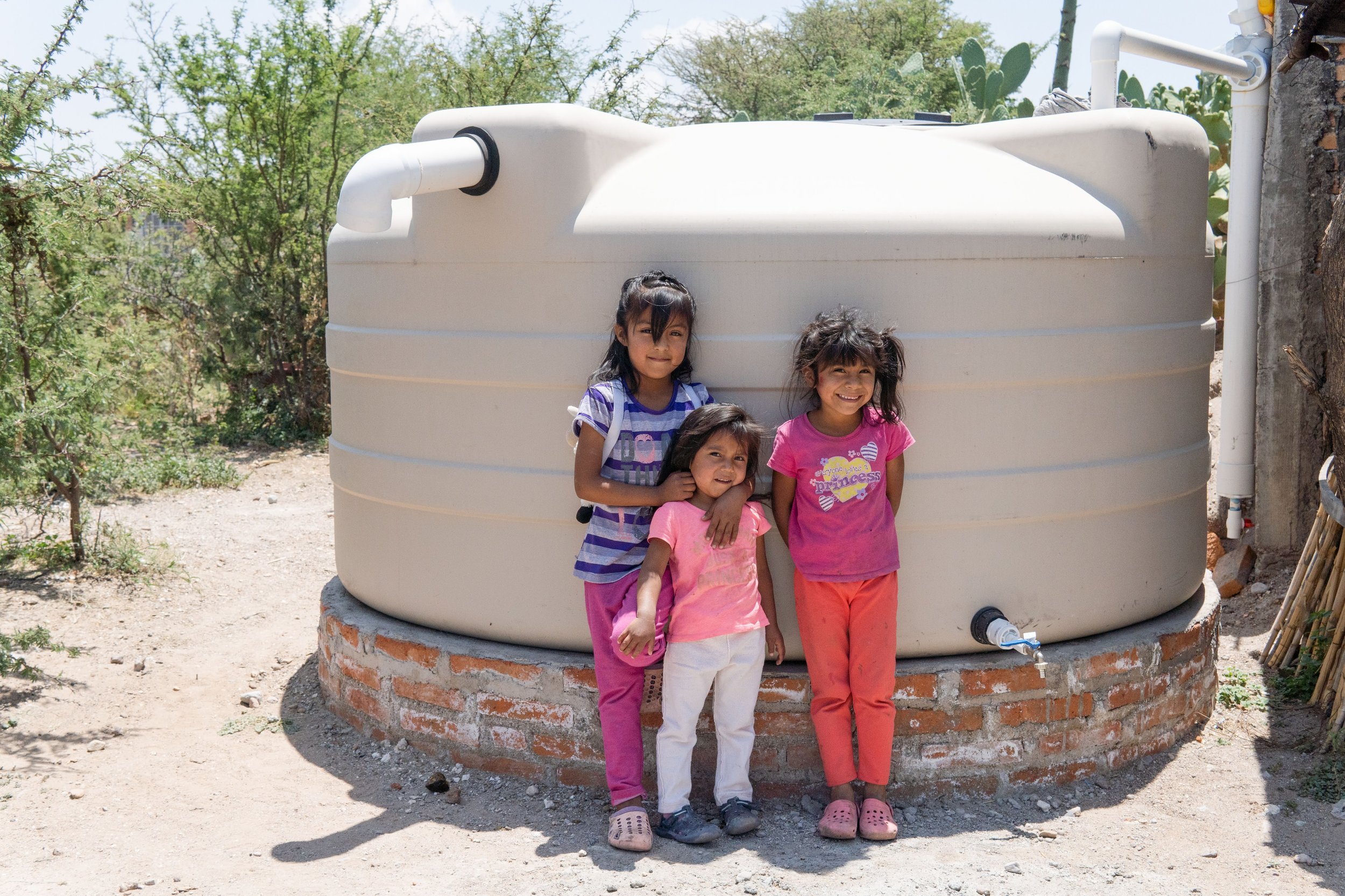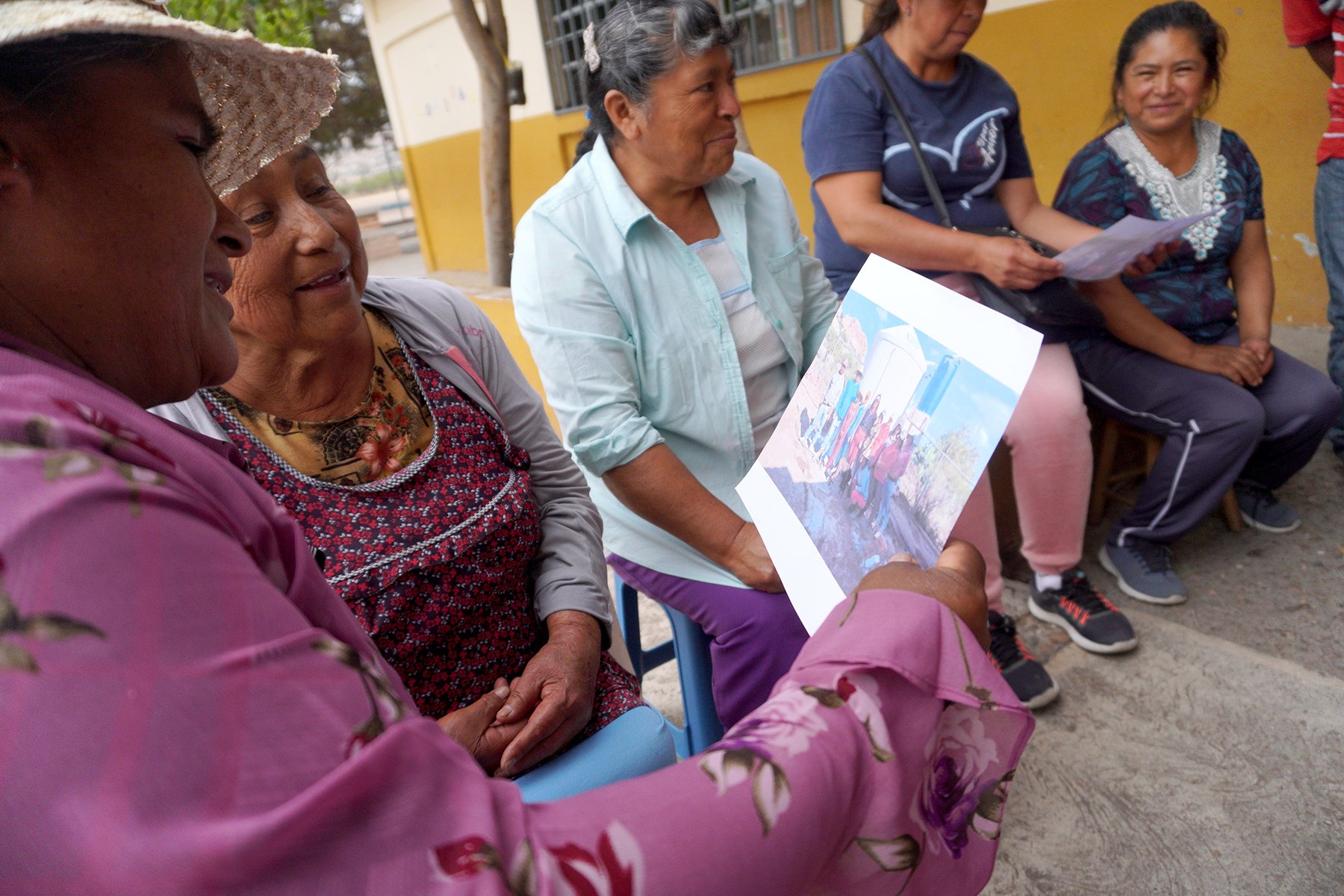
Rainwater Harvesting
Rainwater Harvesting
A Community-Driven Solution to a Water Crisis
Every rainy season, thousands of families across our region breathe a little easier—as their rainwater cisterns begin to fill. Built through Caminos de Agua’s Rainwater Harvesting Program, these systems provide safe, affordable drinking water without the toxic chemicals found in local groundwater.
In northern Guanajuato—one of the most water-scarce regions on Earth—overextraction is pushing wells deeper and pulling up water laced with arsenic and fluoride. The result: chronic health issues including fluorosis, kidney damage, developmental delays in children, and cancer.
Rainwater offers a lifeline. Naturally free of toxic chemicals, and easily purified with a simple filter, it becomes a safe, sustainable source of drinking water—one that puts control back in the hands of local communities.
Rainwater Harvesting by the Numbers
1513 systems
Built as of 2024
627 million
Liters of clean water access created over the systems’ life
167,100 hours
Volunteer hours from community partners to build the systems

Powered by Partnership
Caminos de Agua doesn’t do this work alone. Our Rainwater Harvesting Program is built on deep partnerships with grassroots organizations, local leaders, nonprofit collaborators, and government allies. These relationships ensure every project is rooted in community ownership and long-term sustainability—the key to long-term change.
Over the past seven years, we’ve worked with our partners to install more than 1,500 large-scale rainwater harvesting systems—delivering over 600 million liters of clean water across the watershed. And we’re just getting started.
CUVAPAS: 13 Years on the Frontlines
In the rural communities of San Luis de la Paz, families often receive water only once or twice a week—and what little they do get is dangerously contaminated. Caminos de Agua testing has found fluoride levels more than 18 times and arsenic levels more than 23 times above safe limits in this region.
That’s where CUVAPAS (United Communities for Water and Life) comes in. Led by Luz Villafuerte, this grassroots group has spent over a decade helping communities reclaim their right to clean water through education, technical training, and collective action.
“A grassroots organization has the responsibility to ensure that communities themselves take ownership of the process, actively participating in a continuous learning and leadership experience.”
— Luz Villafuerte, Founder of CUVAPAS
CUVAPAS and Caminos de Agua began collaborating in 2011 with a regional water testing campaign. The results were so alarming that they were presented to the Permanent Peoples’ Tribunal, which stated in 2013 that the Upper Río Laja Watershed should be declared an emergency zone due to environmental and health risks.
Since then, CUVAPAS has helped lead the installation of hundreds of rainwater systems, impacting thousands of lives.

SECOPA: Local Leadership, Lasting Change
In Pozo Ademado, a small rural community in the municipality of San Diego de la Unión, the water crisis is a daily reality. Residents only receive water once a week — and it’s heavily contaminated with fluoride.
Enter SECOPA (Pozo Ademado Community Services), led by local advocate Carmen Castro Mata. SECOPA has become one of our most important partners in advancing community-based water solutions.
“Rainwater harvesting has changed how people here see water. We used to rely on wells—now we know those wells can be dangerous.”
— Carmen Castro, SECOPA
Through SECOPA, Carmen and her team have helped install hundreds of systems and filters, educated the public about contamination, and advocated for better water policy. Carmen has also spoken out about the personal toll of water contamination:
“The water we drink has [high levels of] fluoride… Some of my teeth have fallen out, and it’s happening to many people. This affects our health and our self-esteem.”
SECOPA is also active in environmental education, alternative medicine, and nutrition—making them a holistic force for public health and resilience in the region.

Scaling Impact Through Deep Partnerships
Our rainwater harvesting work isn’t a one-off intervention—it’s a growing movement powered by long-term, on-the-ground collaboration.
At any given time, Caminos de Agua is working in dozens of communities across northern Guanajuato through a network of dedicated partners. These include grassroots organizations, local leaders, and municipal governments who share a vision for a healthier, water-secure future.
One of our most impactful alliances is with the Municipal Government of San Diego de la Unión. In 2018, we partnered with then-Mayor Juan Carlos Castillo Cantero to monitor water quality across the municipality. When he returned to office in 2021, our partnership deepened—resulting in the joint construction of hundreds of rainwater harvesting systems.
“Our collaboration with Caminos has been transcendental for us… Now we are able to capture rainwater and provide people with a dependable source of healthy drinking water… [achieving] a lot of benefits for the families of San Diego de la Unión.”
— Juan Carlos Castillo Cantero, Mayor of San Diego de la Unión
This is what sustainable impact looks like: not just systems in the ground, but shared ownership, collective action, and partners committed to long-term well-being.

Explore the Impact
See where rainwater harvesting systems are transforming lives across our region.
Support Our Work
Caminos de Agua is a nonprofit organization that creates access to clean drinking water through a unique, proven participatory and grassroots approach. Our projects currently provide clean water access to more than 50,000 people in the Upper Río Laja Watershed as well as throughout Mexico. Our goal is to reach 250,000 by 2030. Support our work by making a donation today.



